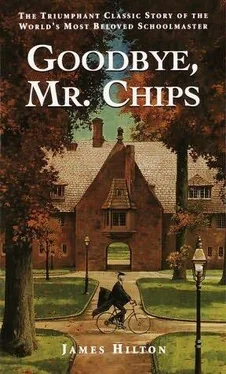"Well, there you are, Mr. Chipping—that's just an example of what I complain of. You hold one opinion and I hold another, and, since you decline to give way, there can't very well be any alternative. I aim to make Brookfield a thoroughly up-to-date school. I'm a science man myself, but for all that I have no objection to the classics—provided that they are taught efficiently. Because they are dead languages is no reason why they should be dealt with in a dead educational technique. I understand, Mr. Chipping, that your Latin and Greek lessons are exactly the same as they were when I began here ten years ago?"
Chips answered, slowly and with pride: "For that matter—umph—they are the same as when your predecessor—Mr. Meldrum—came here, and that—umph—was thirty-eight years ago. We began here, Mr. Meldrum and I—in—umph—in 1870. And it was—um—Mr. Meldrum's predecessor, Mr. Wetherby—who first approved my syllabus. 'You'll take the Cicero for the fourth,' he said to me. Cicero, too—not Kickero!"
"Very interesting, Mr. Chipping, but once again it proves my point—you live too much in the past, and not enough in the present and future. Times are changing, whether you realise it or not. Modern parents are beginning to demand something more for their three years' school fees than a few scraps of languages that nobody speaks. Besides, your boys don't learn even what they're supposed to learn. None of them last year got through the Lower Certificate."
And suddenly, in a torrent of thoughts too pressing to be put into words, Chips made answer to himself. These examinations and certificates and so on—what did they matter? And all this efficiency and up-to-dateness—what did that matter, either? Ralston was trying to run Brookfield like a factory—a factory for turning out a snob culture based on money and machines. The old gentlemanly traditions of family and broad acres were changing, as doubtless they were bound to; but instead of widening them to form a genuine inclusive democracy of duke and dustman, Ralston was narrowing them upon the single issue of a fat banking account. There never had been so many rich men's sons at Brookfield. The Speech Day Garden Party was like Ascot. Ralston met these wealthy fellows in London clubs and persuaded them that Brookfield was the coming school, and, since they couldn't buy their way into Eton or Harrow, they greedily swallowed the bait. Awful fellows, some of them—though others were decent enough. Financiers, company promoters, pill manufacturers. One of them gave his son five pounds a week pocket money. Vulgar... ostentatious... all the hectic rotten-ripeness of the age... And once Chips had got into trouble because of some joke he had made about the name and ancestry of a boy named Isaacstein. The boy wrote home about it, and Isaacstein père sent an angry letter to Ralston. Touchy, no sense of humour, no sense of proportion—that was the matter with them, these new fellows... No sense of proportion. And it was a sense of proportion, above all things, that Brookfield ought to teach—not so much Latin or Greek or Chemistry or Mechanics. And you couldn't expect to test that sense of proportion by setting papers and granting certificates...
All this flashed through his mind in an instant of protest and indignation, but he did not say a word of it. He merely gathered his tattered gown together and with an "umph—umph" walked a few paces away. He had had enough of the argument. At the door he turned and said: "I don't—umph—intend to resign—and you can—umph—do what you like about it!"
Looking back upon that scene in the calm perspective of a quarter of a century, Chips could find it in his heart to feel a little sorry for Ralston, Particularly when, as it happened, Ralston had been in such complete ignorance of the forces he was dealing with. So, for that matter, had Chips himself. Neither had correctly estimated the toughness of Brookfield tradition, and its readiness to defend itself and its defenders. For it had so chanced that a small boy, waiting to see Ralston that morning, had been listening outside the door during the whole of the interview; he had been thrilled by it, naturally, and had told his friends. Some of these, in a surprisingly short time, had told their parents; so that very soon it was common knowledge that Ralston had insulted Chips and had demanded his resignation. The amazing result was a spontaneous outburst of sympathy and partisanship such as Chips, in his wildest dreams, had never envisaged. He found, rather to his astonishment, that Ralston was thoroughly unpopular; he was feared and respected, but not liked; and in this issue of Chips the dislike rose to a point where it conquered fear and demolished even respect. There was talk of having some kind of public riot in the School if Ralston succeeded in banishing Chips. The masters, many of them young men who agreed that Chips was hopelessly old-fashioned, rallied round him nevertheless because they hated Ralston's slave driving and saw in the old veteran a likely champion. And one day the Chairman of the Governors, Sir John Rivers, visited Brookfield, ignored Ralston, and went direct to Chips. "A fine fellow, Rivers," Chips would say, telling the story to Mrs. Wickett for the dozenth time. "Not—umph—a very brilliant boy in class. I remember he could never—umph—master his verbs. And now—umph—I see in the papers—they've made him—umph—a baronet. It just shows you—umph—it just shows you."
Sir John had said, on that morning in 1908, taking Chips by the arm as they walked round the deserted cricket pitches: "Chips, old boy, I hear you've been having the deuce of a row with Ralston. Sorry to hear about it, for your sake—but I want you to know that the Governors are with you to a man. We don't like the fellow a great deal. Very clever and all that, but a bit too clever, if you ask me. Claims to have doubled the School's endowment funds by some monkeying on the Stock Exchange. Dare say he has, but a chap like that wants watching. So if he starts chucking his weight about with you, tell him very politely he can go to the devil. The Governors don't want you to resign. Brookfield wouldn't be the same without you, and they know it. We all know it. You can stay here till you're a hundred if you feel like it—indeed, it's our hope that you will."
And at that—both then and often when he recounted it afterward—Chips broke down.
12
So he stayed on at Brookfield, having as little to do with Ralston as possible. And in 1911 Ralston left, "to better himself"; he was offered the headship of one of the greater public schools. His successor was a man named Chatteris, whom Chips liked; he was even younger than Ralston had been—thirty-four. He was supposed to be very brilliant; at any rate, he was modern (Natural Sciences Tripos), friendly, and sympathetic. Recognising in Chips a Brookfield institution, he courteously and wisely accepted the situation.
In 1913 Chips had had bronchitis and was off duty for nearly the whole of the winter term. It was that which made him decide to resign that summer, when he was sixty-five. After all, it was a good, ripe age; and Ralston's straight words had, in some ways, had an effect. He felt that it would not be fair to hang on if he could not decently do his job. Besides, he would not sever himself completely. He would take rooms across the road, with the excellent Mrs. Wickett who had once been linen-room maid; he could visit the School whenever he wanted, and could still, in a sense, remain a part of it.
At that final end-of-term dinner, in July 1913, Chips received his farewell presentations and made a speech. It was not a very long speech, but it had a good many jokes in it, and was made twice as long, perhaps, by the laughter that impeded its progress. There were several Latin quotations in it, as well as a reference to the Captain of the School, who, Chips said, had been guilty of exaggeration in speaking of his (Chips's) services to Brookfield. "But then—umph—he comes of an—umph—exaggerating family. I—um—remember—once—having to thrash his father—for it. [Laughter] I gave him one mark—umph—for a Latin translation, and he—umph—exaggerated the one into a seven! Umph—umph!" Roars of laughter and tumultuous cheers! A typical Chips remark, everyone thought.
Читать дальше











